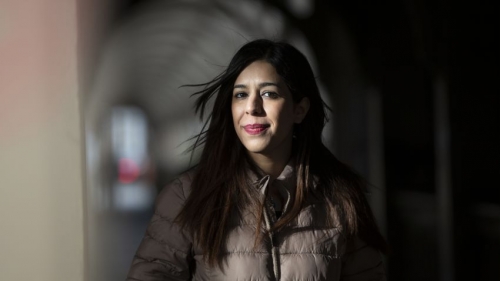
Video Ad Feedback
The Iranian chess referee seeking UK asylum
04:30
– Source:
CNN
Coronavirus and Sport
16 videos

Video Ad Feedback
The Iranian chess referee seeking UK asylum
04:30
Now playing
– Source:
CNN

Video Ad Feedback
Kimie Bessho: The Butterfly Lady of Paralympic table tennis
03:26
Now playing
– Source:
CNN

Video Ad Feedback
Final Olympics preparation underway in Tokyo
02:13
Now playing
– Source:
CNN

Video Ad Feedback
The best home workouts designed by the fittest people on the planet
02:08
Now playing
– Source:
CNN

Video Ad Feedback
Tokyo plows ahead with Olympics
02:31
Now playing
– Source:
CNN

Video Ad Feedback
This Japanese newspaper is sponsoring the Olympics. Its editors want the event canceled
01:38
Now playing
– Source:
CNN

Video Ad Feedback
Australian Open: Amid pandemic, grand slam begins with 30,000 fans attending
02:09
Now playing
– Source:
CNN

Video Ad Feedback
Athletes at the Tokyo Olympics will not need a vaccine to participate, organizers say
01:57
Now playing
– Source:
CNN

Video Ad Feedback
Sofia Kenin: 2020 Australian Open champion opens up
03:06
Now playing
– Source:
CNN

Video Ad Feedback
Japan determined to hold Tokyo Olympics despite cancellation rumors
02:49
Now playing
– Source:
CNN

Video Ad Feedback
Rafael Nadal calls for 'wider perspective' from players ahead of Australian Open
14:25
Now playing
– Source:
CNN

Video Ad Feedback
Australian Open: Controversy surrounds tournament as players complain of lack of practice
03:32
Now playing
– Source:
CNN

Video Ad Feedback
Tokyo considers State of Emergency amid Olympics preparations
03:32
Now playing
– Source:
CNN

Video Ad Feedback
Tokyo 2020's Olympic gymnastics test run
03:24
Now playing
– Source:
CNN

Video Ad Feedback
Third wave of Covid-19 looms in Japan as country preps for Olympic games
01:49
Now playing
– Source:
CNN

Video Ad Feedback
How I quarantined for two weeks to play video games for 100M people
03:16
Now playing
– Source:
CNN
See More Videos
CNN
—
It was a dream come true for Shohreh Bayat to referee the final of the Women’s World Chess Championship earlier this year but what should have been a career highlight quickly turned into a nightmare.
The Iranian chess arbiter is yet to return home to her family following the conclusion of the tournament in January, fearing punishment after she was criticized online for not wearing the appropriate headscarf.
Bayat’s concerns stem from a photograph taken from the event which appears to show her not wearing a hijab. The picture was subsequently shared and Iranian websites reportedly condemned her for what some described as protesting the country’s compulsory law.
“I knew that I had to cover my hair so I did that like many Iranian women but I was wearing a loose hijab because I don’t believe in the hijab,” Bayat told CNN Sport.
“Actually, I hate the hijab. I was just trying to wear it somehow to show that I am not a religious person and I was wearing it in a modern way. By Iranian standards, it was totally okay.”

Shohreh Bayat was the chief arbiter at the Women’s World Chess Championship in 2020.
STR/AFP/AFP via Getty Images
Leaving Iran behind
The photographs in question were taken at the first stage of the chess championship in Shanghai, China, before Bayat flew to Vladivostok, Russia, for the second leg between Ju Wenjun and Aleksandra Goryachkina.
While trying to focus on the job at hand, Bayat was subsequently seeking reassurances from the Iranian Chess Federation who had alerted her to the apparent storm brewing at home.
She said the federation had initially asked for a more appropriate picture of her at the tournament, which Bayat took offense to.
She then says the federation told her to post an apology on her social media channels. She agreed under the condition that it would guarantee her safety but she said the federation refused and purged her picture from their website.
As a result, Bayat decided not to wear what she calls the “misogynistic” hijab anymore and chose not to return to Iran.
CNN reached out to the Iranian Chess Federation on multiple occasions but has not received a response.
Visit CNN.com/sport for more news, features, and videos
Softly spoken and a calming influence on the room, Bayat’s attitude changes whenever she speaks about the hijab.
A steely determination breaks through. So too does a wave of controlled anger with its roots embedded in years of wearing something she never wanted to wear.
The headscarf, or the hijab, has been a mandatory part of women’s dress in Iran since the 1979 Islamic revolution but, in recent years, some women have mounted opposition and staged protests about headwear rules.
Punishment for those found flouting the rules can include imprisonment or lashing, according to Amnesty International.
Bayat says she has often been accompanied by a minder who ensures the country’s rules are followed when she works abroad but says economic issues have seen that role reduced.

Bayat is currently living with friends in the UK.
Hollie Adams/Getty Images Europe/Getty Images
‘Broken’
Fearing such punishment in Iran and making the most of a British visa she had obtained for an upcoming tournament in Gibraltar, Bayat opted to fly to the United Kingdom after the final.
She is currently seeking asylum in the country and is being looked after by the wider chess community.
Despite being “broken” by her situation, she says she’s been blown away by the global support she’s received since her story was shared around the world.
“In chess, we have a motto, we say we are one family,” she added, visibly emotional.
“Since I came here, I felt that I received many many positive impressions from people. It’s not easy to describe it in words.
“I can’t even keep up because there are many, many people who helped me here. So I don’t know how to name them because all of them were nice to me.”
READ: Iran Judo Federation calls suspension ‘unfair’ after being banned

Video Ad Feedback
Activist fights for women to be able to enter soccer stadiums
05:40
– Source:
CNN
However, her decision comes at a cost and a heavy one at that.
Bayat is unsure how and when she will ever see her family again, making the most of daily phone and video calls with her husband to keep her spirits up.
She’s now resigned to the fact she won’t be returning to Iran anytime soon.
“Maybe after 10 years, 15 years. But as long as this regime is in Iran, I don’t think I can come back,” she said, haunted by the prospect.
With the added uncertainly of the coronavirus outbreak, which has rocked Iran and much of the world, the possibility of meeting her family in another country has become even more difficult with traveling severely restricted.
She says she is currently without a passport while her asylum application is processed and concedes the chances of her husband getting a British visa to join her in the UK are unlikely.
“Of course I want to meet my family but right now, I don’t know what is my situation here,” she said.
“If they let me stay here, I can apply for a travel document and try to meet my family in other countries.”

On balance, Bayat says she doesn’t regret her decision.
Hollie Adams/Getty Images Europe/Getty Images
No regrets
Despite her life being turned upside down, Bayat says she doesn’t regret anything about her decision. She just wishes she had protected herself more at the start of the ordeal.
“When you live in Iran, you have to follow these things that hurt you, you have to be a different person that you are not,” she said.
“It’s not easy, all the time you feel unsafe, you feel unhappy by wearing things that you don’t want, by showing yourself something that you are not.
“These are the advantages of my decision; I don’t have to wear the hijab, I don’t have to pretend that I am a Muslim, I can just be what I am.”
